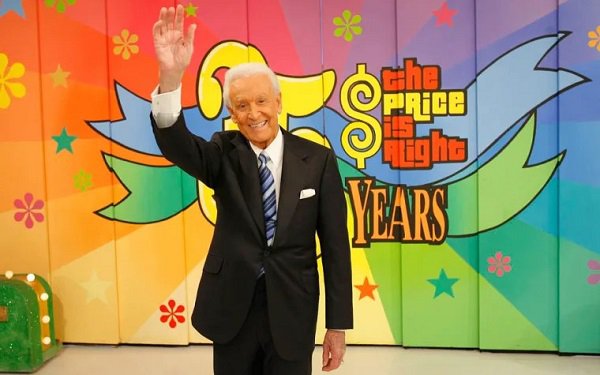Commentary
Bob Barker's Career Spanned Whole History Of TV Game Shows
- by Adam Buckman , Featured Columnist, August 29, 2023

No one personified the image of the well-groomed, nattily dressed game-show host better than Bob Barker, who died Saturday at age 99.
When I spent a day roaming around New York with him in December 1998, he was 75 and in his 27th season as host of “The Price is Right”on CBS. He would eventually make it to 35 seasons, stepping down on June 6, 2007 (pictured above).
He was the best-groomed human being I have ever kept company with. As he made his way around midtown Manhattan, he soaked up love from virtually everyone he encountered.
advertisement
advertisement
In his pin-perfect navy-blue suit, white shirt and red tie, with every one of his white hairs combed perfectly in place, he was instantly recognized by all, even without the long, thin microphone he was famous for holding so elegantly between his manicured fingertips on his TV show.
I asked him why he used such a slender microphone. “I’m always putting the microphone in front of the contestants’ faces,” he explained.
“Many people don’t speak up and I’ll put the microphone practically in their mouths, and we don’t want someone to have this big bulbous thing blocking their faces.”
At the old Planet Hollywood on West 57th Street he was greeted at noon with a birthday cake (his 75th birthday was that very week) and was handed a mike (not one of his slender ones) to address the patrons -- stunned tourists mostly -- who were eating lunch in the restaurant’s spacious dining room.
Asking the group if anyone in the room was 42 years old, Bob announced proudly, “I’ve been on TV every weekday that you’ve been alive!”
At various stops all over town, Bob was presented with birthday cakes -- at the Humane Society, where he promoted his campaign for the spaying and neutering of cats and dogs, and at Rosie O’Donnell’s talk show, where he taped a guest appearance and joined Rosie for a round of Plinko, one of the most popular games on “The Price is Right.”
Waiting in a dressing room before he would be called to go onstage, Barker talked about the nature of game shows and how they had changed since he first started working in television in 1956.
That was the year he began a 19-year run as the host of “Truth or Consequences.”
“What I do has changed tremendously over the years -- this area of broadcasting,” Barker said. “For example, when I started, there was no show that was referred to as a ‘game’ show. They were ‘audience participation’ shows.
“For example, this is before television, Tom Breneman had one of the most popular radio shows in America.
“What did he do? He’d take a hand microphone and he’d walk through a restaurant on Vine Street in Hollywood and he would stop at a table and start talking with people.
“And if these people were entertaining or if they were interesting, or if they were unusual, he might stay at the table for a few minutes. If they weren’t, fine. He’d go on to the next table. He would do that for a half-hour.
“That was a charming show and very popular. It was called ‘Breakfast in Hollywood.’ When I did ‘Truth or Consequences’ on television, it was a people-oriented show.
“You didn’t just walk up and hit someone in the face with a pie and think you were going to get a laugh.
“You had to create the atmosphere in which the audience wanted to see this pie thrown and anticipated it being thrown and enjoyed it far more as a result, all because you had established the personality of the contestant.
“It was a people-oriented situation. But [in 1958] along came a show called ‘Concentration’ [a show in which contestants’ memories were put to the test].
“When ‘Concentration’ became a popular show, the game show was born. The personality of the contestant playing ‘Concentration’ was not important to the show because you were watching the board.
“After that, one game show after another was developed and they started referring to them as game shows, and not only that, the hosts changed.
“I was just about the last of a breed of hosts who had a background in radio, who had done shows from grocery markets, had done shows from theaters, had done shows from drugstores, done man-on-the-street shows where you stood on the street with a microphone and you talked with people and had interesting conversations with them.”
Whatever the shows came to be called -- audience-participation shows, game shows or quiz shows -- Bob Barker’s career encompassed the history of such shows on TV.
They kept him steadily employed, and in our lives, for 51 years.




Billy Joel apparently wrote the lyrics in the reverse direction. Only the old die good.